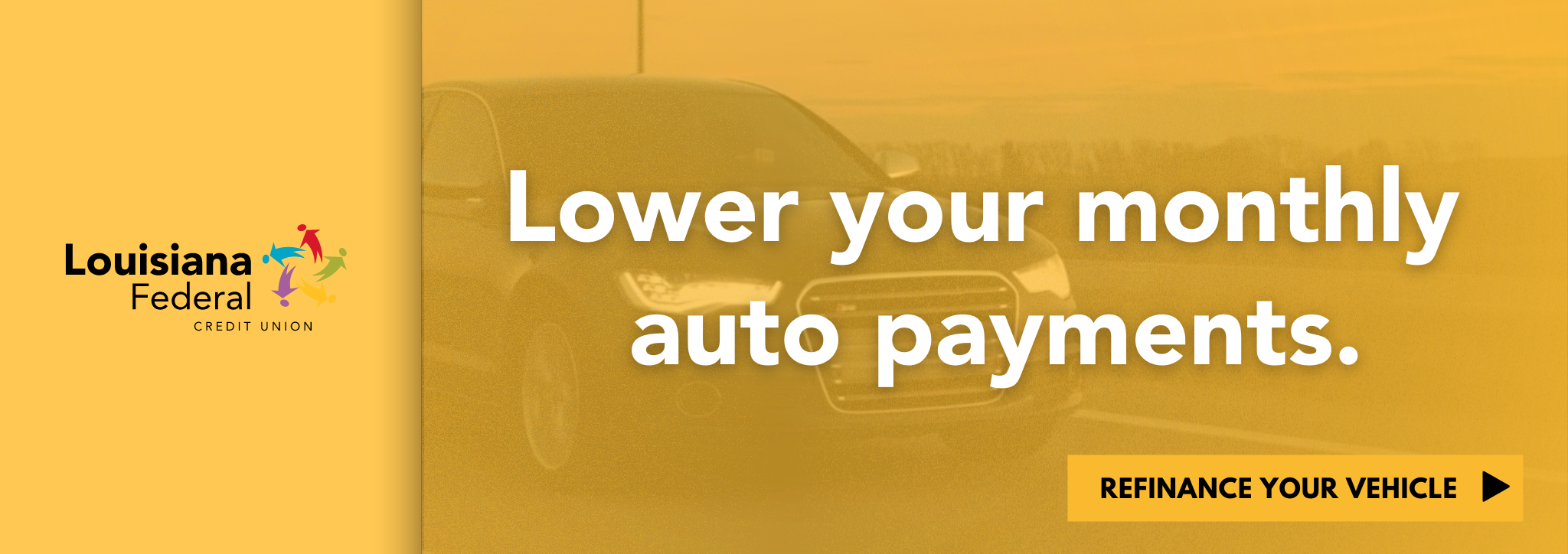
Did you know that your car can do more than just take you places? It can also help with your money situation. Here are three different strategies you can leverage to get the most out of your vehicle's worth.
Traditional auto refinancing.
A traditional auto refinance loan allows you to replace your existing loan with a new one that has better terms. All future payments will then go towards the new loan.
How would I benefit?
Think of traditional auto refinancing as a trade-in. You swap out your old car loan for a new one with friendlier terms. It can help you secure a lower interest rate, saving you money over the life of the loan. Additionally, refinancing can lower your monthly payments, giving your budget some much-needed breathing room. And if you opt for a shorter term with a lower interest rate, you can even pay off your loan faster and save on interest payments.
Not sure if refinancing is right for you? Using an online savings calculator can help you determine you crunch the numbers and see your potential savings.
Cash-out refinance loan.
With cash-out auto refinancing, you can withdraw cash from your car's value and use it for any purpose. The catch? The new loan is more than what you owe on your car. But the extra cash is yours to spend however you like.
Give it to me straight. Is that a good idea?
If you need cash fast, a cash-out refinance loan can provide a financial cushion for unexpected costs, like medical bills or home repairs. It also gives you a chance to work with a different lender who might offer better rates and terms that fit your budget. If you have other debts, using a cash-out refinance loan to bundle them together could lower your overall interest payments and potentially shrink your monthly payments. (If you are looking for other options to consolidate your debt, consider a debt consolidation loan)
However, there are also drawbacks to consider. If you choose to add cash-out to your refinancing loan, you may need to extend your loan term to make the monthly payments affordable. Meaning it will take you longer to pay off your vehicle. Additionally, cash-out auto refinancing does not always guarantee lower interest rates and smaller monthly payments. If you opt for a longer loan term to reduce your monthly payments, you may end up paying more for the vehicle in the long run.
Auto Equity Loan.
An Auto Equity Loan is like getting a second loan using your car's value as a backup. You have to pay back both your original car loan and this new loan, instead of replacing your existing loan (like cash-out refinancing).
Break it down for me further.
Similar to a home equity loan, an auto equity loan is a loan that is based on the value of your car. If your car is fully paid off, the loan could be up to the full market value of your car. If you still owe money on your loan, the equity is the car's value minus the remaining loan balance.
For example: If your car is worth $20,000 and you owe $5,000 on it, you have $15,000 in equity. That's the maximum you could borrow in this case.
However, the maximum loan amount you can borrow depends on the lender's policies. Some lenders allow you to borrow your entire equity, like the $15,000 in the previous example. Others may offer loans up to 125% of your equity, which would be $18,750 in this case ($15,000 x 125%).
Auto equity loans have advantages such as low interest rates due to the collateral nature of the loan. In some cases, they may be easier to get than unsecured loans and do not require homeownership. However, managing multiple loans and the risk of losing your car if you fail to make payments are important considerations. Additionally, finding lenders for auto equity loans may be difficult as they are not widely available.
Don't own your car? Negotiate lease terms or consider a lease buyout loan.
If you're leasing a car, it's like paying a company to use their car. When the lease is over, you have a few choices:
- Return the car and don't lease another one.
- Swap the car for a new lease.
- Buy the car with cash.
- Use a loan to buy the car (this is called a lease buyout loan)
Before the lease ends, you'll find out how much you need to pay to buy the car. This is called the residual value. The dealer might suggest you get a lease buyout loan with them, but you can also get a loan from other places, like banks and credit unions.
Relevant article: The truth about 0% financing offered at dealerships
What should I expect when choosing a lease buyout loan?
When you buy out your lease, you become the owner of the car, giving you the freedom to make modifications and drive without any mileage restrictions or overage fees. You can also sell the car at any time and use the funds to purchase a new vehicle. This eliminates the continuous lease payments, freeing up money in your budget for other financial goals.
However, your monthly payment may increase because loan payments are usually more than lease payments. You might also lose some perks, like free maintenance and auto repairs.
Ultimately, the decision to buy out your lease depends on your personal preferences and financial situation.
